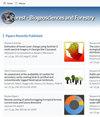The effects of forest management on biodiversity in the Czech Republic: an overview of biologists’ opinions
IF 1.7
4区 农林科学
Q2 FORESTRY
引用次数: 3
Abstract
Europe has been dominated by cultural landscape and rather intensively managed forests. It is thus no surprise that the ongoing global biodiversity crisis as well as the consequences of climate change have been apparent. In recent years, forestry in Central Europe has been going through a crisis caused by extensive disturbances primarily in commercial monocultures; this phenomenon is particularly striking in the Czech Republic. Given the significance of the situation, it is essential to review and optimise the current forest management practices in relation to biodiversity protection. Therefore, a survey among Czech biologists was conducted in an effort to provide specific feedback to foresters and other stakeholders based on scientific and empirical knowledge of the survey respondents. The survey assessed the forest habitat (in terms of light conditions and the structure of the forest environment), forest management tools and conceptual approaches regarding specific species and groups of organisms. The respondents negatively perceived the current forestry practices, especially in terms of creating homogeneity across the forest environment and eliminating important habitats. Structurally diverse old-growth forests as well as the open forests with the presence of old and habitat trees were emphasised by the survey respondents as essential environments. Large-scale non-intervention within protected areas is necessary to support the presence of old-growth forests. On the other hand, there is an urgent need to restore open forests which requires (but not exclusively) the active efforts of man. These two basic appeals are essential in order to diversify the landscape through a combination of segregative and integrative forest management tools that aim to support biodiversity.捷克共和国森林管理对生物多样性的影响:生物学家观点综述
欧洲一直以文化景观和相当密集管理的森林为主。因此,持续的全球生物多样性危机以及气候变化的后果已经显而易见也就不足为奇了。近年来,中欧的林业经历了一场危机,主要是由商业单一栽培的广泛干扰造成的;这一现象在捷克共和国尤为突出。鉴于这种情况的重要性,必须审查和优化与生物多样性保护有关的当前森林管理做法。因此,在捷克生物学家中进行了一项调查,旨在根据调查受访者的科学和经验知识向林业工作者和其他利益相关者提供具体反馈。调查评估了森林生境(在光照条件和森林环境结构方面)、森林管理工具和关于特定物种和生物群体的概念方法。受访者对目前的林业做法持负面看法,特别是在整个森林环境造成同质性和消除重要栖息地方面。结构多样的原生林以及有古树和栖息地树的开放森林被调查者强调为必不可少的环境。保护区内大规模的不干预是支持原始森林存在的必要条件。另一方面,迫切需要恢复开放的森林,这需要(但不完全是)人类的积极努力。为了通过旨在支持生物多样性的分离和综合森林管理工具的结合,使景观多样化,这两项基本呼吁是必不可少的。
本文章由计算机程序翻译,如有差异,请以英文原文为准。
求助全文
约1分钟内获得全文
求助全文
来源期刊

Iforest - Biogeosciences and Forestry
FORESTRY-
CiteScore
3.30
自引率
0.00%
发文量
54
审稿时长
6 months
期刊介绍:
The journal encompasses a broad range of research aspects concerning forest science: forest ecology, biodiversity/genetics and ecophysiology, silviculture, forest inventory and planning, forest protection and monitoring, forest harvesting, landscape ecology, forest history, wood technology.
 求助内容:
求助内容: 应助结果提醒方式:
应助结果提醒方式:


